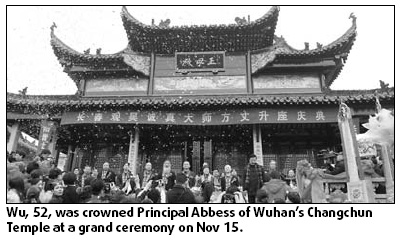Newsmaker
First woman leader of Taoist clerical orthodoxy
By Erik Nilsson and Guo Rui (China Daily)
Updated: 2009-12-14 08:40
 |
Large Medium Small |
Changchun Temple has in recent years donated more than 4 million yuan to help victims of disasters, such as the Sichuan earthquake, the blizzards in South China, Typhoon Morakot in Taiwan and the Indonesian tsunami. It has also contributed to building charitable Hope Schools for poor children in rural areas.
Wu disagrees with commercializing spirituality, as Shi Yongxin has done for the Shaolin Temple. She says she doesn't know much about the entrepreneurial monk, except that he cruises around in luxury cars when visiting Beijing.
The temple provides Wu, who has lived there in a 10-sq-m room for three decades, a 370-yuan monthly allowance.
She lifts her robe to reveal holes in her sweater and then slips off her 25-yuan shoes, exposing toes that stab through tears in her socks.
"It's funny, isn't it?" she says, giggling.
"What's on the outside doesn't matter. My happiness comes from my soul," she explains, pointing to her heart and then to her temple.

Her greatest source of joy is personal development, she says.
Wu is finishing her dissertation through a four-month seminar at Renmin University organized for 52 religious figures.
Because Wu, who is 52, doesn't know how to use a computer, she handwrote 24 pages of the paper and had her apprentice type it for her. The study examines Taoism's function in creating a harmonious society.
"There shouldn't be any nuclear weapons, war or pollution, because these aren't propitious to the world," she says, tapping the paper and chuckling.
"People should be more like water, because water can absorb and hold a lot of things."
In 2001, Wu earned her first graduate degree at Huazhong University of Science and Technology in Wuhan.
Her degrees are honorary, because she only finished high school before the "cultural revolution" (1966-76). After a brief stint as an accountant after graduation, she began self-study at the temple but received no other formal higher education.
She became a Zhu Chi (lower-ranking abbess) of the temple in 1995. This May, when the temple decided to choose a principal abbess, the leaders of all departments of the temple unanimously chose Wu.
All Chinese Taoist temples have Zhu Chi, but only the prominent ones have Fang Zhang.
Leaders from the State Administration for Religious Affairs and the Chinese Taoist Association attended the grand ceremony at which Wu became the principal abbess.
Wu believes her new appointment will bring new tribulations.
She likens it to the heroes of the story Journey to the West, in which the pilgrims who received a divine calling to retrieve Buddhist scriptures from faraway lands faced a myriad of harrowing obstacles.
"If the gods chose me to do this, they'll place greater difficulties in my path," she says.
"But facing these will assist my self-refinement and make me a better Taoist."









